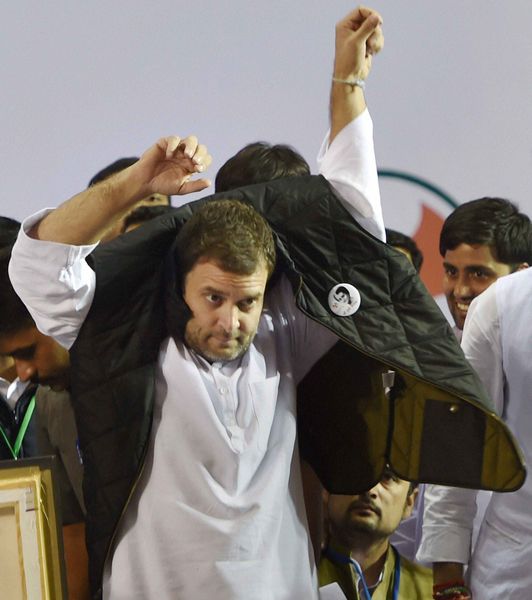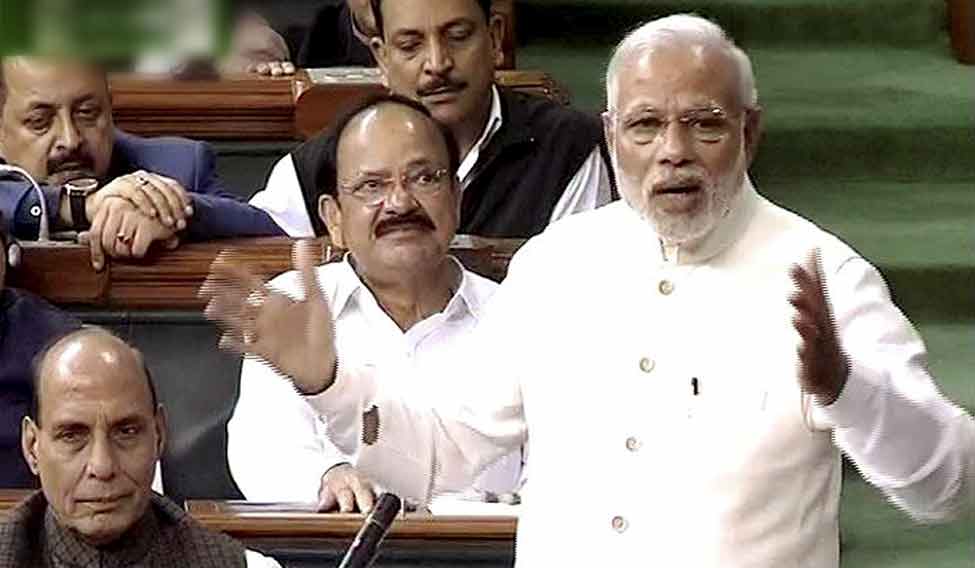On November 28, Kaushal Vidyarthee, a young DPhil scholar at Oxford University, tweeted: “Dear PM Modi, U didn’t need 18 months, 3 land ordinances, Bihar defeat, sluggish economy to meet opposition leaders.”
Vidyarthee was surprised that Prime Minister Narendra Modi had finally got off his high horse to invite former prime minister Manmohan Singh and Congress president Sonia Gandhi for “chai pe charcha”. It was Modi's first effort at meeting opposition leaders since he assumed office in May 2014. Such meetings often bridge political divides and break logjams over crucial legislative businesses.
It is not clear how surprised Manmohan and Sonia were when Modi invited them. The BJP, however, was clearly satisfied with the way things panned out at the meeting, which took place in the living room of 7 Race Course Road, the prime minister's official residence. Finance Minister Arun Jaitley, who was present at the meeting along with Parliamentary Affairs Minister Venkaiah Naidu, later said the discussion was “constructive”.
The message went out that the Congress had three reservations on the Goods and Services Tax Bill, which the BJP wants to pass in the winter session of Parliament, now under way. The GST Bill is the biggest of the current crop of reforms the government wants to see passed in Parliament. And, in a way, on it hinges Modi's image. His ‘tete-a-tea’ was to make the Congress relent, and ensure the passage of the bill. With the smaller opposition parties having fallen in line, the Congress alone stood in the way of having uniform tax across the country.
The first sign of the change in the BJP’s political strategy came when Modi returned home after attending the climate change conference in Paris. When he came to Parliament, he shook hands with opposition leaders and exchanged pleasantries. His demeanour came as a surprise to many MPs: gone were the swagger and aggression. Even Naidu appeared uncharacteristically well disposed, indicating that some kind of business-like bonding strategy was being unveiled.
It became clear that the smiles and pleasantries were part of the BJP’s attempt to create an atmosphere conducive to the passage of crucial bills. As Jaitley held forth on the GST Bill in Parliament, message went out to party MPs to “exercise restraint”. Naidu asked them “to refrain from making provocative remarks during debates”. “This [making provocative remarks] will make us fall into the opposition’s trap of raising controversies and stalling business,” he told them.
“MPs were told to speak with understanding and decorum,” said Union Minister Mukhtar Abbas Naqvi. “There is a need to avoid controversy at a time when the prime minister is pushing ahead with his development agenda. A wrong step will allow anti-BJP forces to grab the benefit.”
The government refused to allow any debate or resolution condemning the rising incidents of intolerance in the country. Many opposition leaders used the discussion on commitment to the Constitution, held as part of B.R. Ambedkar’s 125th birth anniversary celebrations, to raise the subject. But the BJP’s response to the opposition’s jabs was unusually muted. Both Modi and Home Minister Rajnath Singh, whose speeches on the Constitution touched upon the intolerance issue, held back from their usual Congress bashing. But the BJP’s softer approach and the diktat to its MPs have not been enough to convince people that ‘achche din’ will come, in terms of intolerance giving way to acceptance of diversity.
According to Hindi poet Manglesh Dabral, who recently returned his Sahitya Akademi award in protest of the rising intolerance, Modi is keeping his mask on. The new strategy, he said, is courtesy of the BJP’s recent poll debacle in Bihar and the defeat in Ratlam-Jhabua Lok Sabha byelection in Madhya Pradesh. “This MP constituency was their stronghold,” he said. “The candidate was expected to get sympathy votes. The people in Bihar and Ratlam have taught the BJP a lesson: the hard line won't work; aggressive hindutva is not what we want.”
The rise in intolerance and communal polarisation have tarnished Modi’s image in the west to the point that The New York Times wrote a scathing editorial rebuking him. “All this has contributed to the sudden shift in the [attitude] of Modi and the BJP. They [the new initiatives] are damage-control efforts. This adoption of the middle path is to get the GST and other bills passed,” said Manglesh, who termed the BJP’s change “tactical, not real”.
It is not just the critics who doubt the new, nonaggressive Modi. Some BJP MPs, too, have their misgivings. They pointed out that while they got a gag order in Parliament on a subject that touches everyone, the “habitual offenders” (those who have been making provocative remarks) were not singled out.
The Congress appeared to reciprocate the prime minister's attitude by relaxing its stand on the GST bill. But the party has not taken the BJP bait. In his speech in the Lok Sabha, party vice president Rahul Gandhi named the BJP’s “habitual offenders” and pointed to the prime minister turning a blind eye to them. “I have today sitting in front of me an ex-chief of the Indian Army,” said Rahul. “A general who likened two little babies who were burned to death to dogs. He has challenged the Constitution and the fundamental right to equality by equating dalit children to dogs. Our prime minister allows this man to continue as minister as if nothing has happened. I have Sakshi Maharaj and Yogi Adityanath sitting here in front of me. You are all aware of the language they use. Yet the prime minister remains silent. Modiji talks about defence of the country. He talks of FDI in defence. Mohammad Akhlaq, the father of the young Air Force officer Mohammad Sartaj, who is serving our nation, is killed in cold blood because he is a Muslim…. The man ultimately responsible for his protection remains silent.”
 Up in arms, still: Despite the BJP's friendly overtures, Rahul Gandhi has not stopped flaying the Modi government | PTI
Up in arms, still: Despite the BJP's friendly overtures, Rahul Gandhi has not stopped flaying the Modi government | PTI
It was not the Congress alone that refused to buy into Modi’s new image. Trinamool Congress MP Sugata Bose rebutted the BJP line that India is not intolerant, saying, “We are not saying India is intolerant. We are saying supporters and even some members of this government are spreading a virulent form of prejudice and bigotry. The refusal to condemn and take action against the offenders on the part of the leader of this government must be seen as out of sync with the concept and value of Constitutional morality.”
Asaduddin Owaisi of the All India Majlis-e-Ittehadul Muslimeen ridiculed the BJP’s idea of tolerance, saying: “I continue to be intolerant because that is my democratic right. Is that the tolerance you are talking about?”
The unusually tame speech of Modi and the typically cautious speech of Rajnath notwithstanding, many members from the treasury benches continued to indulge in Congress bashing with ‘your intolerance vs my tolerance’ speeches, undermining the efforts at making opposition parties support crucial bills. Telecom Minister Ravi Shankar Prasad asked why those who were talking about intolerance now had remained silent during the times when Kashmiri Pandits suffered, the 1984 riots happened and the Emergency was declared. Naqvi said the intolerance debate in the Lok Sabha had “unmasked those who were misleading the country”. Naidu said intolerance existed all over the world, and that “India is a thousand times better than any other country”.
The cordial chai pe charcha at the PM’s residence notwithstanding, the BJP is not convinced that the Congress concerns on the GST Bill were valid. Said a party source: “There is no basis in the points they made. If we address their concerns, we would need a Constitutional amendment ever so often. It is simply not practical.” Grapevine says BJP leaders felt that, of the two invitees, “one had authority and no wisdom, and the other, wisdom but no authority”.
The Congress is not inclined to allow the BJP to walk away with all the credit for the eventual passage of the GST bill, which was its from the beginning. Sources say the party will extract its pound of flesh by demanding that the prime minister sack one minister, something that will be seen as the result of the opposition's relentless attack on intolerance, perceived to be encouraged by the BJP.
The BJP's climbdown in terms of its attitude towards the Congress and the opposition is seen as the consequence of the Bihar poll debacle, the pressure from the corporate world to get on with the reforms, and the realisation that a parliamentary logjam ultimately harms the ruling party more than the opposition.
Pramod Kumar, political scientist and head of the Chandigarh-based think-tank Institute for Development and Communication, said he saw no change in Modi. “In Bihar, people crushed arrogance, represented by Modi, and elected corruption, represented by Lalu Prasad, as the lesser evil. Modi has learnt that arrogance does not get you votes or support within or outside the party,” he said. “Modi has no original model of development. He successfully implemented the Manmohan Singh model of development in Gujarat and wants to do that in India. The Congress, too, wants that model implemented. Lots of big business houses are exerting pressure on both the government and the Congress. Modi's arrogance was coming in the way, with the Congress wanting him to climb down. He had no choice.”
The BJP's directive to MPs to mind their language applies only for speeches in Parliament. A party leader pointed out that “no force on earth” can make Sakshi Maharaj or Yogi Adityanath not speak the way they do. “And yet, they win election after election,” he said. Intolerance, according to him, was perceived differently in urban and rural India.
At the BJP’s Diwali Milan in Delhi on November 28, many party leaders suggested that, in Bihar, the messengers should have been different, but not the message. According to them, Modi should not have been the one talking about caste. Such talk should have been left to Union Ministers Uma Bharti and Sadhvi Niranjan Jyoti or even the fringe elements in the party.
The BJP may be right in saying that intolerance is not unique to India, and that it has always been there in varying degrees. Why then the heightened fear of intolerance now? Historian and biographer Sanjay Subrahmanyam recently hit the nail on the head, when he told the BBC, “It seems that the concerns stem from the fact that the BJP has such a massive majority in Parliament, which may seem an occasion for them to impose their agenda in a way they could not from 1998 to 2004, when the party was in power. People would be less concerned if this was a coalition government.”
WHAT MODI SAID IN THE RAJYA SABHA
* There cannot be any doubt on the patriotism of 125 crore Indians. There is no need for anyone to prove their patriotism day and night.
* If there is any incident of atrocity against anybody, it is a blot on all of us—for society as well as the nation. We should feel the pain and ensure that such things do not happen.
* I give more importance to the Rajya Sabha, the house of elders. There cannot be any discussion where there are no elders.
* The Rajya Sabha should not be an obstruction in the way of framing laws.
* How we should run this house is important. The nation is looking at us.







